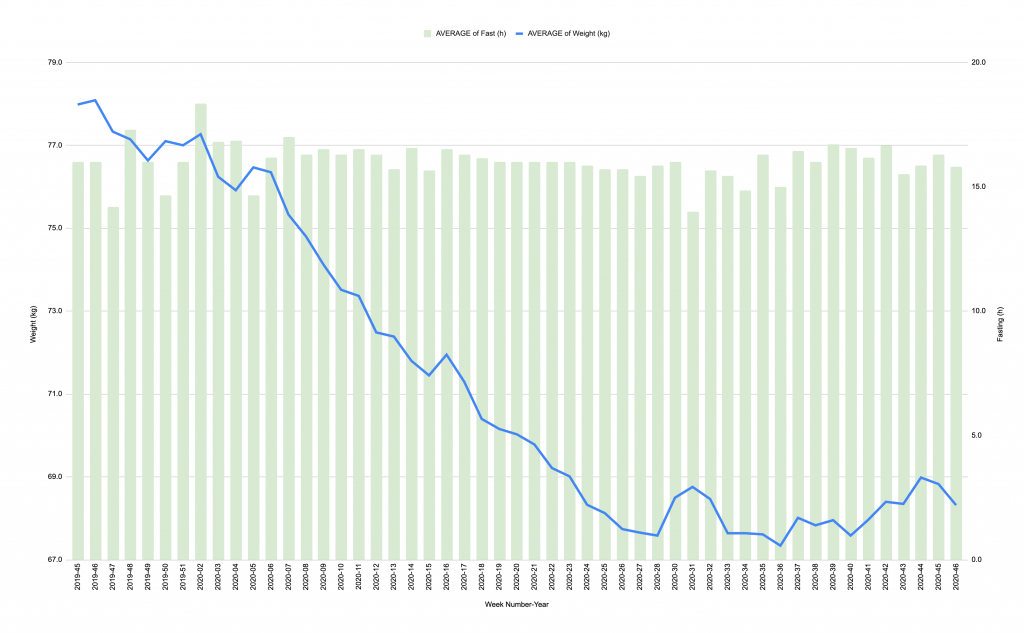Quite a deviation from the technology focused articles that I usually post on this blog, but I have been thinking about this for a while, thanks also to COVID-19 lock-downs, and wanted to write down a few thoughts and notes.
Premise: I’ve been obese or overweight for most of my life. My best guess is that I got close to 115 kg at my heaviest, and I would be considered tall only for a hobbit basketball team. I started keeping track of my weight when I was about 20 years old, and decided to do something about it, also because my knees and ankles were falling apart. Ignoring some set-backs – the dreaded yo-yo effect – I consider my efforts quite successful.
I’ve learned a few things along the way. Not necessarily in order of importance:
- Drastic changes won’t last. You can starve yourself and lose weight, but you’ll get that weight back, and some more. It’s not a matter of “if” but “when”.
- Find a sport that you like, and use it to balance the calories intake instead of relying on drastic diets.
- Learn to cook, stop eating crap.
- Keep an eye on your weight. Stepping on a scale every day is not needed, once or twice a week is good.
But, in the end, it’s mostly about finding something that works for you. Which brings me to the title of this post: intermittent fasting (or IF).
A few years ago, I saw this documentary from BBC, called Eat, Fast, Live Longer (by Michael Mosley). I was quite skeptic at the beginning, but this turned out to be the “thing that works for me”.
The concept is simple: you have periods where you can eat (often called “windows”), alternated to periods where you don’t eat anything, and you’re only allowed to drink water, tea, or coffee (without sugar or other additives). Some folks are less strict about the fasting period, but I personally stick to water, occasionally espresso coffee.
There are different intermittent fasting patterns, the most common being:
- 16:8 – You eat within a 8 hours window, then fast for 16 hours straight.
- 18:6, 20:4 – Same concept, longer fasting period. The more extreme version is OMAD (one meal a day).
- 5:2 – You eat for 5 days, then fast for 2 days straight (sounds fun, doesn’t it?).
I tried 16:8 a few years back, skipping breakfast, but it wasn’t really working for me. About a year ago, I noticed my weight slowly but worryingly increasing (did I mention to keep track of your weight?), and decided to give it a try again. But this time I would keep track of what was happening, and how good I was at sticking to my goals.
Normally I eat breakfast quite early in the morning (often well before 7AM), have lunch around 12, then a closing snack around 2PM. In case of social events, e.g. dinners, I would try to rotate my schedule, but without losing my mind if I couldn’t fast for 16 hours for a couple of days.
Here are the results of 1 year worth of tracking weight and number of fasted hours (using an Android app called Zero), averaged by week.

On top of helping me lose more weight that I hoped for at my age, I realized how much IF helped me in COVID-19 times, while I work from home and personally cook every meal I eat. Here are a few benefits:
- Having one meal per day helps limiting the calories intake, assuming weight loss is your goal.
- I only need to cook – and wash dishes – once per day. It might seem a small thing, but working with a US company means that 4-8PM are my busiest hours of the day. So, dinner often ended up consisting of unhealthy food that didn’t require too much time or effort.
- I sleep a lot better, since I don’t end up in bed with my stomach still working on digestion.
- Energy levels are unaffected, or possibly positively affected. For example, earlier this year I lowered my half-marathon personal best by 6 minutes (around 1:50), and I’ve already exceeded my overall running goal of 1300 km for 2020.
OK, but what are the negatives?
- It works well for me because I live alone, and I’m not exactly a social animal. If you have to cook for someone else, or meals represent a social gathering in your family, then you need to adapt your schedule accordingly. And that means no breakfast, which is OK for some, terrible for others.
- It would be challenging to organize my sport activities around a different schedule: running fasted is quite OK, but you are supposed to eat soon after exercising, and my body doesn’t seem to like running in the afternoon.
- Medical conditions (e.g. diabetes) might require extra care, and IF could just not be suitable for some folks.
As they say, “your mileage might vary”, but maybe it’s worth a try now that you’re likely stuck at home.
Leave a Reply